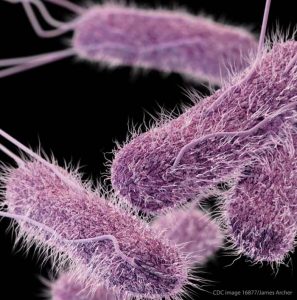Researchers at the University of California-Davis have made a breakthrough in developing a vaccine against Salmonella bacteria.
 The research will be published this week in the Proceedings of the National Academy of Sciences. Scientists found a set of antigens in the bacteria that are the same in human beings and mice. This may lead to a vaccine that can be tested in mice before being approved for human use.
The research will be published this week in the Proceedings of the National Academy of Sciences. Scientists found a set of antigens in the bacteria that are the same in human beings and mice. This may lead to a vaccine that can be tested in mice before being approved for human use.
Antigens are substances that make your body produce antibodies in an immune response. Scientists may be able to create a vaccine against those specific antigens by developing a harmless inactive or purified version of the antigen, or by using a cell that has the bacteria’s surface components, but none of its DNA.
The Centers for Disease Control (CDC) estimates that there are 1.4 million Salmonella infections in the United States every year, although only about 40,000 cases are confirmed. Salmonellosis is a serious disease, hospitalizing and killing almost 600 people each year in this country. And more and more of the bacteria are becoming resistant to antibiotics, so a potential vaccine is promising.
The project was funded by The National Institutes of Health, GlaxoSmithKline, and the Wellcome Trust. Collaborators include UC Irvine, the University of Malawi, Novartis Vaccines Institute for Global Health in Italy, and the University of Birmingham, England.
A bit of history about Salmonella: Ten years ago, thousands of people became ill in Britain after eating Salmonella-contaminated eggs. So farmers in that country began vaccinating their hens for the bacteria. That virtually wiped out the threat, reducing the human cases 96% from 1997 to 2009.
But the FDA thought there wasn’t enough evidence that vaccinating hens would prevent human illness, and didn’t include that mandate in egg safety rules put into effect in the spring of 2010.
Then in August 2010, a huge recall of more than half a billion eggs from two producers in Iowa sickened hundreds of people all across the United States.
The problem with Salmonella in hens is that the bacteria is present in the infected chicken’s ovaries so it is right in the egg from the moment it starts to develop. And chickens that appear healthy can be harboring the bacteria.
About one-half to two-thirds of American farmers do vaccinate their chickens, although there isn’t a law requiring them to do so. FDA rules require testing for Salmonella in the henhouses and in the chickens if the henhouse test is positive.




